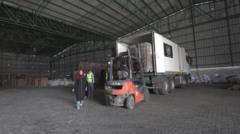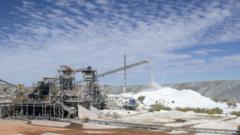Despite a five-month ceasefire, Israel executed an airstrike in Beirut, asserting it targeted a Hezbollah missile stockpile. The Lebanese government condemned the attack, urging the US and France to intervene as tensions between the two nations escalate once again.**
Israel Airstrike in Beirut Raises Fears of Renewed Conflict Amid Ceasefire Tensions**

Israel Airstrike in Beirut Raises Fears of Renewed Conflict Amid Ceasefire Tensions**
Israeli forces have conducted an airstrike in Beirut's southern suburbs targeting Hezbollah, intensifying concerns about the stability of a recently brokered ceasefire.**
Israel conducted an airstrike on Sunday in Beirut's southern suburbs, targeting a building allegedly used by the Iranian-backed militia, Hezbollah. This military action raised alarm regarding an ongoing ceasefire established five months prior, which had ostensibly quelled hostilities between Israel and Hezbollah.
The Israeli military justified the strike by claiming it was aimed at a store of "precision-guided missiles" that it asserted posed a direct threat to Israel and its citizens. Israel emphasized its right to defend against perceived dangers from Hezbollah, which it regards as a terrorist organization.
The Lebanese presidency quickly condemned the airstrike, calling on the United States and France, who had facilitated the ceasefire, to exert pressure on Israel to halt its military actions. The strike is particularly significant as it marks the first attack on Hezbollah's stronghold in Dahieh, Beirut, in nearly a month, and comes despite multiple allegations from Western officials that Hezbollah has largely complied with the ceasefire terms.
In the moments following the airstrike, residents reported witnessing large clouds of smoke rising from the site of the strike. Lebanese Civil Defense authorities reported no casualties, and efforts were made to extinguish the fire caused by the explosion. However, the perception of growing instability is palpable among the residents of the region.
President Joseph Aoun of Lebanon issued a strong statement on social media, urging the international community to hold Israel accountable. The statement underscored concerns that Israel's actions could exacerbate regional tensions and pose a risk to the fragile peace established after months of conflict.
The Israeli government, including Prime Minister Benjamin Netanyahu's office, reaffirmed its commitment to act against Hezbollah's perceived threat. They stressed that the neighborhoods of Beirut should not function as a refuge for groups that Israel labels as hostile.
Jeanine Hennis-Plasschaert, the UN’s Special Coordinator for Lebanon, also expressed concern over the potential for escalated violence, describing the atmosphere of panic created by the strike. She urged both parties to refrain from further actions that could jeopardize the tenuous ceasefire.
The recent airstrike is a reminder of the fragile nature of peace in the region, as previous assaults have resulted in casualties, including the recent killing of a Hezbollah official, which returns the area to uncertainties about the future stability of Lebanon and its relationship with Israel.




















